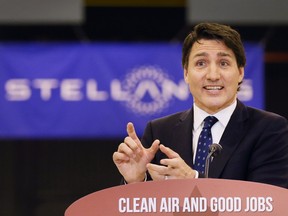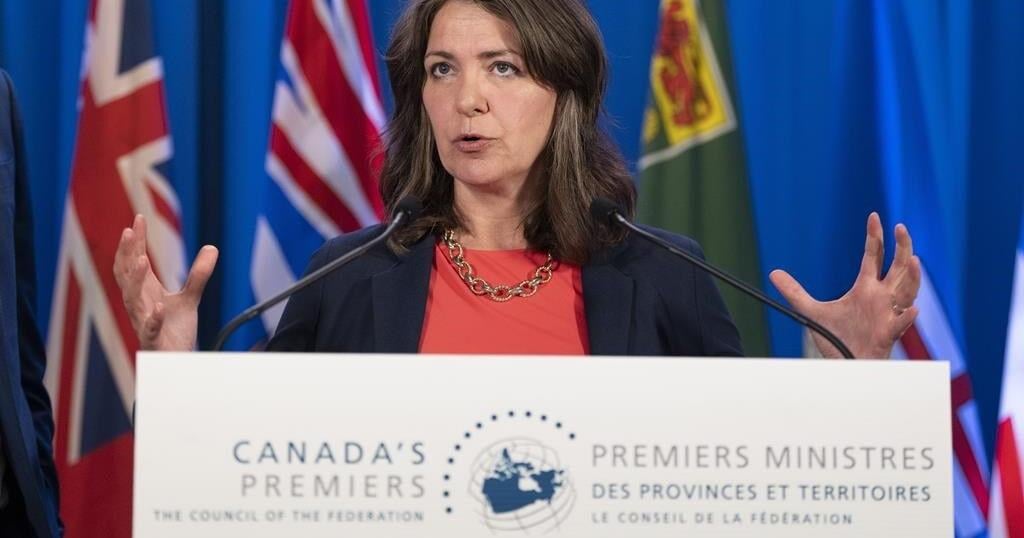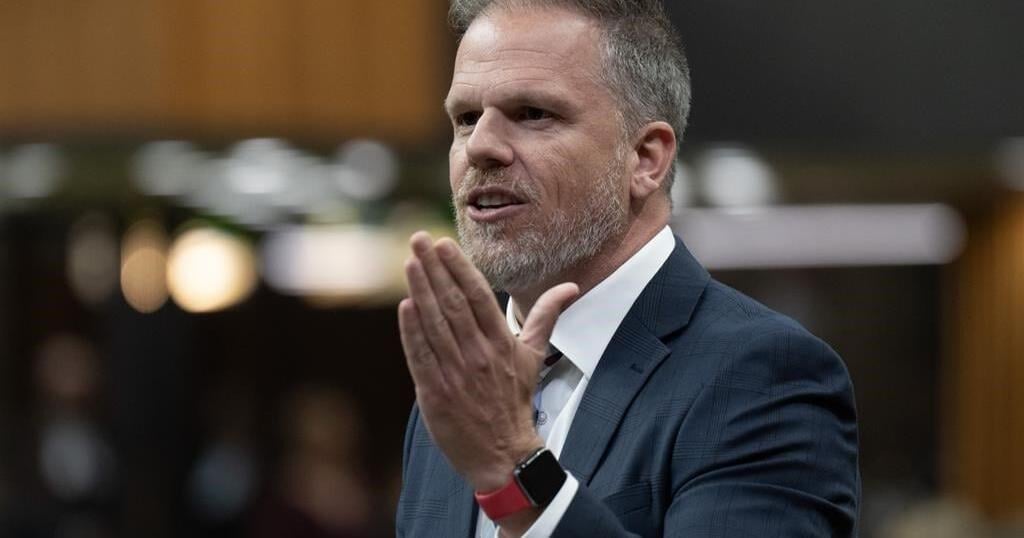The Stellantis deal in Windsor is up in the air again and that could mean trouble for thousands of auto jobs in Brampton.
Politics
LILLEY: Auto workers sweat as Trudeau plays political games

Last weekend, it looked like a deal had been struck that saw the Ford government at Queen’s Park join the Trudeau government in Ottawa to sweeten the pot to secure the Stellantis deal.
Stellantis had stopped work on their electric vehicle battery plant earlier in the week, the reason given, the Trudeau government hadn’t lived up to promises made to the company. Instead of proceeding with work on the plant, the company said they were examining “contingencies,” which is another way of saying they were looking at moving production to the United States.
The Biden administration in Washington has been offering lucrative incentives in the form of the Advanced Manufacturing Production Credit, a tax break for companies building things like electric vehicle batteries.
Shortly after Stellantis stopped construction, the Trudeau government said the real problem was that Ontario wasn’t paying its fair share for the deal. That started a public relations war between Ottawa and Queen’s Park to get the Ford government to sweeten what they were offering to Stellantis.
Determined to get a deal, Ford agreed to Trudeau’s terms in exchange for other concessions such as the feds easing up on opposition to Ontario building Hwy. 413 and being supportive of the Ring of Fire plans to mine critical minerals in Northern Ontario.
According to sources close to Stellantis, the deal the federal government presented to the company was effectively the same deal as the previous one but now with Ontario bearing some of the federal burden.
For Stellantis, that could be as simple as moving module production across the river to Detroit or perhaps going somewhere deeper inside the U.S. That would mean the loss of about 300 jobs at the Windsor plant once construction is complete, but the impact wouldn’t be limited to Southwestern Ontario.
There are worries by some in the auto sector that if Stellantis pulls the module plant they will also pull production from their auto assembly plant in Brampton, which employs just shy of 3,000 workers. That’s not a view shared by all the players involved but it is a concern.
Some auto industry types now believe that is up in the air as Stellantis looks at all contingencies.
Stellantis and Unifor, the union representing workers at all the plants involved, declined to comment when contacted Friday. Requests for comment by various representatives from the Ford and Trudeau government were ignored.
Meanwhile, workers in Windsor and Brampton worry about their future.
Political games are being played and, once again, it’s the people working the line who may pay the price.

News
Alberta Premier Smith aims to help fund private school construction

EDMONTON – Alberta Premier Danielle Smith says her government’s $8.6-billion plan to fast-track building new schools will include a pilot project to incentivize private ones.
Smith said the ultimate goal is to create thousands of new spaces for an exploding number of new students at a reduced cost to taxpayers.
“We want to put all of the different school options on the same level playing field,” Smith told a news conference in Calgary Wednesday.
Smith did not offer details about how much private school construction costs might be incentivized, but said she wants to see what independent schools might pitch.
“We’re putting it out there as a pilot to see if there is any interest in partnering on the same basis that we’ll be building the other schools with the different (public) school boards,” she said.
Smith made the announcement a day after she announced the multibillion-dollar school build to address soaring numbers of new students.
By quadrupling the current school construction budget to $8.6 billion, the province aims to offer up 30 new schools each year, adding 50,000 new student spaces within three years.
The government also wants to build or expand five charter school buildings per year, starting in next year’s budget, adding 12,500 spaces within four years.
Currently, non-profit independent schools can get some grants worth about 70 per cent of what students in public schools receive per student from the province.
However, those grants don’t cover major construction costs.
John Jagersma, executive director of the Association of Independent Schools and Colleges of Alberta, said he’s interested in having conversations with the government about incentives.
He said the province has never directly funded major capital costs for their facilities before, and said he doesn’t think the association has ever asked for full capital funding.
He said community or religious groups traditionally cover those costs, but they can help take the pressure off the public or separate systems.
“We think we can do our part,” Jagersma said.
Dennis MacNeil, head of the Public School Boards Association of Alberta, said they welcome the new funding, but said money for private school builds would set a precedent that could ultimately hurt the public system.
“We believe that the first school in any community should be a public school, because only public schools accept all kids that come through their doors and provide programming for them,” he said.
Jason Schilling, president of the Alberta Teachers’ Association, said if public dollars are going to be spent on building private schools, then students in the public system should be able to equitably access those schools.
“No other province spends as much money on private schools as Alberta does, and it’s at the detriment of public schools, where over 90 per cent of students go to school,” he said.
Schilling also said the province needs about 5,000 teachers now, but the government announcement didn’t offer a plan to train and hire thousands more over the next few years.
Alberta NDP Leader Naheed Nenshi on Tuesday praised the $8.6 billion as a “generational investment” in education, but said private schools have different mandates and the result could be schools not being built where they are needed most.
“Using that money to build public schools is more efficient, it’s smarter, it’s faster, and it will serve students better,” Nenshi said.
Education Minister Demetrios Nicolaides’ office declined to answer specific questions about the pilot project Wednesday, saying it’s still under development.
“Options and considerations for making capital more affordable for independent schools are being explored,” a spokesperson said. “Further information on this program will be forthcoming in the near future.”
This report by The Canadian Press was first published Sept. 18, 2024.
News
Health Minister Mark Holland appeals to Senate not to amend pharmacare bill

OTTAWA – Health Minister Mark Holland urged a committee of senators Wednesday not to tweak the pharmacare bill he carefully negotiated with the NDP earlier this year.
The bill would underpin a potential national, single-payer pharmacare program and allow the health minister to negotiate with provinces and territories to cover some diabetes and contraceptive medications.
It was the result of weeks of political negotiations with the New Democrats, who early this year threatened to pull out of their supply-and-confidence deal with the Liberals unless they could agree on the wording.
“Academics and experts have suggested amendments to this bill to most of us here, I think,” Independent Senator Rosemary Moodie told Holland at a meeting of the Senate’s social affairs committee.
Holland appeared before the committee as it considers the bill. He said he respects the role of the Senate, but that the pharmacare legislation is, in his view, “a little bit different.”
“It was balanced on a pinhead,” he told the committee.
“This is by far — and I’ve been involved in a lot of complex things — the most difficult bit of business I’ve ever been in. Every syllable, every word in this bill was debated and argued over.”
Holland also asked the senators to move quickly to pass the legislation, to avoid lending credence to Conservative critiques that the program is a fantasy.
When asked about the Liberals’ proposed pharmacare program for diabetes and birth control, Conservative Leader Pierre Poilievre has often responded that the program isn’t real. Once the legislation is passed, the minister must negotiate with every provincial government to actually administer the program, which could take many months.
“If we spend a long time wordsmithing and trying to make the legislation perfect, then the criticism that it’s not real starts to feel real for people, because they don’t actually get drugs, they don’t get an improvement in their life,” Holland told the committee.
He told the committee that one of the reasons he signed a preliminary deal with his counterpart in British Columbia was to help answer some of the Senate’s questions about how the program would work in practice.
The memorandum of understanding between Ottawa and B.C. lays out how to province will use funds from the pharmacare bill to expand on its existing public coverage of contraceptives to include hormone replacement therapy to treat menopausal symptoms.
The agreement isn’t binding, and Holland would still need to formalize talks with the province when and if the Senate passes the bill based on any changes the senators decide to make.
This report by The Canadian Press was first published Sept. 18, 2024.
The Canadian Press. All rights reserved.
Politics
Review finds no case for formal probe of Beijing’s activities under elections law

OTTAWA – The federal agency that investigates election infractions found insufficient evidence to support suggestions Beijing wielded undue influence against the Conservatives in the Vancouver area during the 2021 general election.
The Commissioner of Canada Elections’ recently completed review of the lingering issue was tabled Tuesday at a federal inquiry into foreign interference.
The review focused on the unsuccessful campaign of Conservative candidate Kenny Chiu in the riding of Steveston-Richmond East and the party’s larger efforts in the Vancouver area.
It says the evidence uncovered did not trigger the threshold to initiate a formal investigation under the Canada Elections Act.
Investigators therefore recommended that the review be concluded.
A summary of the review results was shared with the Canadian Security Intelligence Service and the RCMP. The review says both agencies indicated the election commissioner’s findings were consistent with their own understanding of the situation.
During the exercise, the commissioner’s investigators met with Chinese Canadian residents of Chiu’s riding and surrounding ones.
They were told of an extensive network of Chinese Canadian associations, businesses and media organizations that offers the diaspora a lifestyle that mirrors that of China in many ways.
“Further, this diaspora has continuing and extensive commercial, social and familial relations with China,” the review says.
Some interviewees reported that this “has created aspects of a parallel society involving many Chinese Canadians in the Lower Mainland area, which includes concerted support, direction and control by individuals from or involved with China’s Vancouver consulate and the United Front Work Department (UFWD) in China.”
Investigators were also made aware of members of three Chinese Canadian associations, as well as others, who were alleged to have used their positions to influence the choice of Chinese Canadian voters during the 2021 election in a direction favourable to the interests of Beijing, the review says.
These efforts were sparked by elements of the Conservative party’s election platform and by actions and statements by Chiu “that were leveraged to bolster claims that both the platform and Chiu were anti-China and were encouraging anti-Chinese discrimination and racism.”
These messages were amplified through repetition in social media, chat groups and posts, as well as in Chinese in online, print and radio media throughout the Vancouver area.
Upon examination, the messages “were found to not be in contravention” of the Canada Elections Act, says the review, citing the Supreme Court of Canada’s position that the concept of uninhibited speech permeates all truly democratic societies and institutions.
The review says the effectiveness of the anti-Conservative, anti-Chiu campaigns was enhanced by circumstances “unique to the Chinese diaspora and the assertive nature of Chinese government interests.”
It notes the election was prefaced by statements from China’s ambassador to Canada and the Vancouver consul general as well as articles published or broadcast in Beijing-controlled Chinese Canadian media entities.
“According to Chinese Canadian interview subjects, this invoked a widespread fear amongst electors, described as a fear of retributive measures from Chinese authorities should a (Conservative) government be elected.”
This included the possibility that Chinese authorities could interfere with travel to and from China, as well as measures being taken against family members or business interests in China, the review says.
“Several Chinese Canadian interview subjects were of the view that Chinese authorities could exercise such retributive measures, and that this fear was most acute with Chinese Canadian electors from mainland China. One said ‘everybody understands’ the need to only say nice things about China.”
However, no interview subject was willing to name electors who were directly affected by the anti-Tory campaign, nor community leaders who claimed to speak on a voter’s behalf.
Several weeks of public inquiry hearings will focus on the capacity of federal agencies to detect, deter and counter foreign meddling.
In other testimony Tuesday, Conservative MP Garnett Genuis told the inquiry that parliamentarians who were targeted by Chinese hackers could have taken immediate protective steps if they had been informed sooner.
It emerged earlier this year that in 2021 some MPs and senators faced cyberattacks from the hackers because of their involvement with the Inter-Parliamentary Alliance on China, which pushes for accountability from Beijing.
In 2022, U.S. authorities apparently informed the Canadian government of the attacks, and it in turn advised parliamentary IT officials — but not individual MPs.
Genuis, a Canadian co-chair of the inter-parliamentary alliance, told the inquiry Tuesday that it remains mysterious to him why he wasn’t informed about the attacks sooner.
Liberal MP John McKay, also a Canadian co-chair of the alliance, said there should be a clear protocol for advising parliamentarians of cyberthreats.
This report by The Canadian Press was first published Sept. 17, 2024.
-

 News2 hours ago
News2 hours agoSleep Country shareholders approve sale to Fairfax Financial
-

 News2 hours ago
News2 hours agoNurse-patient ratios at B.C. hospitals set to expand in fall, says health minister
-

 News2 hours ago
News2 hours agoAlberta Premier Smith aims to help fund private school construction
-

 Economy2 hours ago
Economy2 hours agoConstruction wraps on indoor supervised site for people who inhale drugs in Vancouver
-

 News2 hours ago
News2 hours agoSecond-half goals lift defending MLS champion Columbus past Toronto FC
-

 News2 hours ago
News2 hours agoFirst-degree murder charge in death of five-year-old Quebec boy: Crown
-

 News2 hours ago
News2 hours agoHealth Minister Mark Holland appeals to Senate not to amend pharmacare bill
-

 News2 hours ago
News2 hours agoVancouver Canucks will miss Demko, Joshua, others to start training camp
























